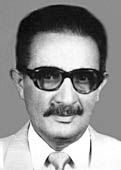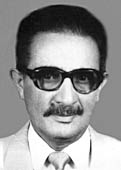
“The citizens’ trust in the State must be restored through positive action.” [Archives:1998/36/Interview]
September 7 1998

For the best of part of three decades, Taqi worked at the Yemeni Bank for Construction and Development. Upon retirement, he has devoted almost all his time to journalism.
Mohammed Bin Sallam of Yemen Times talked to Mr. Taqi about his work in Yemen’s oldest newspaper. He filed the following interview. Excerpts:
Q: When did you start working in journalism?
A: In the early 1970s, there were only two daily newspapers in the country: Al-Thawra in Sanaa and Al-Jumohoriya in Taiz. Both are state-owned. I felt then that there should be an independent publication to provide a forum for the alternative point of view. So a group of intellectuals, writers and journalists got together, discussed the matter and decided to publish Sanaa.
I approached the then Minister of Information, Mr. Ahmed Dahmash, who very much welcomed the idea. He even exempted us from paying fees for a publication permit.
The first issue of Sanaa – edited by Mr. Mohsin Al-Aini, former Foreign Minister and Premiere – was met with a lot of approval by its readers. The second issue was edited by the late Mohammed Ali Othman.
Q: This was not the first time a publication by that name appeared in Yemen. Could you briefly tell us about its predecessor?
A: The beginning was in 1879, during the Ottoman occupation of Yemen. Sanaa then consisted of two pages: one in Arabic and the other in Turkish. But its demise came when the Turks left Yemen.
Q: Can you tell us more about the conditions in journalism and publishing at the time you decided to launch Sanaa ?
A: At the start, we faced numerous difficulties, which we were able to surmount with a lot of enthusiasm and encouragement by friends and well-wishers.
Sanaa was published by Yemeni Company for Printing and Publishing, which also used to print Al-Thawra daily. The printing process was quite primitive then. When the Offset printing press was introduced into Yemen in the mid-1970s, Sanaa came to be published by the Al-Thawra Establishment for Printing and Publishing. For the last ten years, however, Sanaa has been printed by 26 September printing press.
The line adopted by Sanaa was not always compatible with that of the authorities. So the best part of ten years was spent in a tug-of-war game with the government. At one time, Sanaa’s chief editor was put under house arrest and threatened with imprisonment.
Q: Were there any other independent newspapers published in Sanaa?
A: Sanaa was the first one, followed in one year by Al-Ray Al-Aam published by Mr. Ali Al-Olufi and Al-Horiya by Mr. Abdulkarim Sabra. These three remained the only ones until the unification of Yemen. After unity, licenses were granted to more than 170 publications.
Q: How do describe the direction adopted by Sanaa today?
A: Sanaa has the honor of following a wholly balanced and overtly patriotic line of action. Ten years ago, I was offered five million riyals to relinquish Sanaa, but I refused categorically.
At one time in the recent past, we had to print Sanaa in Syria. It used to be sold on the black market in Yemen for ten times its cover price. This shows how popular it was. Sanaa was, still is and ever will be an independent publication. It has determinedly kept independence despite many attempts by various political organizations to engulf it in their party politics. The paper has never stopped during the last 27 years of its existence.
Moreover, although I am a senior member of the ruling People’s General Congress, my paper is very much healthily independent.
Q: Do you receive any financial support of any kind?
A: No, not at all. And that is how we managed to keep it away from any outside influence.
Q: What is Sanaa’s circulation?
A: Sanaa used to have a circulation of between 10,000 and 15,000. With the onset of the current economic crisis and the rise in the price of paper, we have had to reduce the number of copies printed to 7,000 only.
Q: How do you estimate the size of its readership?
A: Sanaa has quite a following among the general public. Almost no copies are returned.
Q: Your photograph appeared in Newsweek. How did this come about?
A: This was when the information desk at the Yemen Embassy in Washington was opened for the first time. I was treated as a guest of honor. I met the US Vice President, a number of Congressmen and the director of the International Development Agency.
Q: Who are the most prominent people who have been interviewed by Sanaa?
A: We interviewed Jacques Chirac when he was the mayor of Paris, the assistant to George Bush’s running mate during the presidential campaign and Bush’s aide for the Middle and Near Eastern affairs. Interviews were also made with the Jordanian army Chief of Staff, King Fahad when he was Crown Prince and with Prince Sultan Bin Abdulaziz.
Q: How do you evaluate democracy in general and freedom of the press in particular in Yemen today?
A: We cannot really say that there is real freedom of the press, as recognized by the rest of the world. There is, however, a reasonable margin of freedom available for journalists. But what is really followed is the adage ‘let them say what they want, and we’ll do what we want.’
Democracy is a complete system of rules and institutions, in addition to a well educated populace that understands what democracy really is. Democracy flourishes in the midst of an educated people, which constantly monitors the state’s performance.
During a recent visit to the Central Organization for Control and Audit, President Ali Abdullah Saleh said that the media should uncover and publicly denounce corrupt officials. But I have quite a daring question: can any journalist really denounce a senior government official publicly? The obvious answer is No!
Democracy, freedom of the press, freedom of expression, etc, in a backward country like Yemen are really just slogans. Can any journalist go to an apartment block in an upper middle class area in Sanaa, say, take photos and say that this edifice is owned by so- and-so who embezzled so much from the state coffers? The answer is again No! Nobody dares to do such a thing.
Real democracy is to be able to hold corrupt people accountable for their wrong deeds. Democracy is a whole range of responsibilities that is governed by many rules and regulations.
President Ali Abdullah Saleh is a patriotic person, and is trying to build a modern state. Unfortunately, he has not yet been completely successful. He certainly has achieved many great things: unification, a group of important development projects, agricultural growth, oil and gas exploitation, and many others. We all aim to establish a state of law and order.
Q: How do you see the reform program going?
A: Financial and administrative reform is a strategic goal. However, I do not understand how a senior public official could give his very expensive government car to his son or his wife to go shopping. All expenses are paid by public money, of course. In the US, for instance, a government car is only used for official business.
Q: It is often rumored that some senior officials chew qat at a cost equivalent to the salaries of 300 junior public employees per month. How can this happen?
A: Yes, some officials chew qat worth 3,000 riyals every day. Such people must be regarded as a saboteurs. Where do they get such money? It certainly is not from their monthly government salary. Bribery and corruption are rife.
People have lost confidence in the State. They see corrupt officials go unpunished, on the contrary, they flourish. The citizens’ trust in the State must be restored through positive action.
All sorts of contradictions are present in Yemen, it is frightening. We as intellectuals are bewildered.
Q: What is your estimation of the number of people who read newspapers and other publications in Yemen?
A: It is not more than 5%. I mean newspapers only circulate in major towns and cities, and are read by a particular segment of educated people and political ” amateurs.”
Q: How effective is the opposition in Yemen?
A: There is no real opposition in Yemen. An effective opposition must rely on a wide popular base, through which it can have a say in parliament. Thus, a balance can be struck in parliament with the ruling party. Also, the opposition can then effectively monitor the government’s performance with the aim of rectifying it if necessary. There is no democracy without an effective opposition, which is certainly not just a bunch of newspapers attacking the government.
Q: Do you see a satisfactory resolution to Yemen’s economic crisis?
A: Yemen is not a poor country, but has huge natural resources. The main malady is that these resources are wasted or stolen. The equation must be: work plus intensive production equals a strong economy. We have totally the opposite in Yemen. The economic crisis will persist, unless real corrective measures are taken. Only true economic reform can restore the people’s self-confidence.
——
[archive-e:36-v:1998-y:1998-d:1998-09-07-p:./1998/iss36/intrview.htm]


